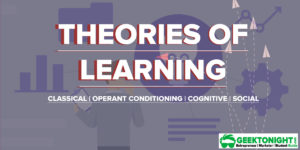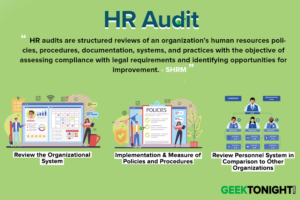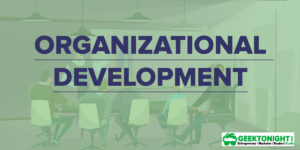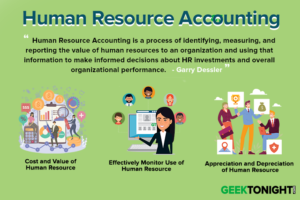Role of HR Professionals in Performance Management
The power of an organization is increasingly linked to its intellectual capital rather than its physical assets. People are now the drivers of corporate performance and competitiveness.
Therefore, performance management deals with improving organizational performance by improving employee performance; essentially, the cost of competitiveness involves efficiency and productivity.
Dr Mritunjay Arthreya (2004) observed that workforce productivity constitutes around 60 per cent of the total cost. Therefore, the growing significance of performance management needs no further emphasis.
Table of Content
HR professionals play an important role in designing a performance management system in organizations. The extent to which HR professionals
- Demonstrate subject matter expertise;
- Draw upon relevant theory an research evidence and
- Influence through leaders within organizations to focus energy on the aspects of performance management that make a significant difference to performance.
Human resource professionals should follow a win-win approach in order to help managers and their employees succeed.
Role of HR Professional as a Strategic Partner
The role of the HR manager must parallel the needs of his or her changing organization and nowadays successful organizations are becoming more adaptive, resilient, quick to change direction and customer-centred.
Within the changing environment, the HR professional, who is considered necessary by line managers, is a strategic partner, an employee sponsor or advocate and a change mentor.
Appraising HR Functions
Human Resources are responsible for initiating the performance appraisal process for the department. It is to assess the performance of its staff. On top of it, there task is to design and develop the Performance Management System of the organization.
According to Peter F. Drucker, “The business has two basic functions: marketing and innovation. Marketing and innovation produce results; all the rest are costs.”
In these types of situations, the objective of the HR function is to provide a favourable and supporting climate and appropriate systems. The purpose is to align human performance with the business strategies of the organization. The two major crises faced by Human Resource in these situations are:
- Identity crisis in defining its role in the organization, and
- Accountability crisis in demonstrating the value of HR contribution in improving the organization’s performance
The major problem with the HR function in any organization is that its results are difficult to quantify in the balance sheet. This leads to the downgrading of its contributions. Based on the balanced scorecard method, the ‘Performance scorecard’ methodology can be evolved to appraise the performance of the HR function.
The performance scorecard enables the leadership to determine how effectively HR is leveraging on human capital, as well as mobilize and galvanize the people within the organization. It is done in terms of four perspectives-quality, cost, delivery, and responsiveness.
By using performance scorecard, it helps in appraising HR functions from the following perspectives:
Operations Perspective
The operations perspective includes the internal business processes and their alignment with HR functions and it should find out the key problems and their effective solution. The metrics based on this perspective allow senior leadership to know the effectiveness and efficiency.
It also helps in knowing the quality of these HR processes in meeting organizational and environmental requirements.
Financial Perspective
To keep the cost of compensation and benefits at an optimal level is another important HR function. It is required for HR professions that they should consider the organization’s ability to pay and other growth perspectives.
They need to focus on the employee’s contribution in terms of financial data with respect to an investment made on employees.
HR Perspective
This perspective includes employee training and corporate cultural attitudes. These training programs are related to both individual and corporate self-improvement. Organizational success depends on how effectively the organizations are discovering and managing their human resources.
The key differentiator between the successful and unsuccessful organizations is the effectiveness of knowledge-worker and today’s HR function needs to develop an innovative workforce capable of delivering results at all times, consistently and continuously.
Customer Perspective
In recent days, organizations have realised the importance of customers in business success and they have also realised that if customers are not satisfied, they will eventually find other organizations that will meet their needs.
Future Role of HR Professionals in Performance Management in Knowledge Millennium
The HR professionals have some key future roles in the organization which are discussed as below:
- Strategic Partner
- Making Effective Forecasts
- Acting as Performance Counsellor
- Employee Advocate
- Change Champion
Strategic Partner
In today’s organizations, HR managers need to think of themselves as strategic partners to guarantee their viability and ability to contribute. When the HR persons are in this role, they contribute to the development of and the accomplishment of the organization-wide business plan and objectives.
The organizations are establishing HR business objectives to support the attainment of the overall strategic business plan and objectives.
HR representatives should be tactical and deeply knowledgeable about the design of work systems in which people succeed and contribute because the strategic partnership impacts HR services such as the design of work positions; hiring; reward, recognition and strategic pay; performance development and appraisal systems; career and succession planning; and employee development.
To meet these challenges, the HR professionals as strategic business partners will be required to perform the following functions:
- The HR professionals will be required to craft and execute corporate strategy. These strategies will result in inimitable results, actions, and behaviour of human resources of the organization.
- They will have to play a pivotal role in the identification of performance gaps and benchmarking. It is for enabling a higher level of individual performance so that the synergistic effect can be obtained.
- In organization, the HR professional shall be entrusted with the job of taking stock of performance-related issues and problems on a proactive basis.
- He must assist managers and top management in boosting overall organizational performance. It is done through human resources by creating appropriate performance-oriented work culture, devising innovative reward and compensation systems, managing talent pools, developing competencies and managing appropriate ethical behaviour in the organization.
Making Effective Forecasts
In this global business scenario, only those organizations are successful which are making effective forecasts and taking appropriate steps to take the maximum advantages and it is possible only when the employees of the organization are capable, competent, motivated, and committed, and deliver excellent performance on a continuous basis.
In such a scenario, performance problems are likely to occur. In this situation, there are two ways open to HR professionals-either wait for the inevitable performance problem to occur, or anticipate performance problems by sniffing around. By pre-empting performance problems of the organization, the HR professionals can save organizations a lot of cost. The cost can be calculated in terms of failed efforts, lost opportunities, counselling time and efforts, etc.
Acting as Performance Counsellor
For improving an employee’s performance, performance counselling is a manager initiated strategy. It is a supportive process conducted by a manager to enable an employee to define and work through personal problems or organizational changes.
The reason is that it affects job performance. It means better bottom-line results; organizations recognize and reward such managers. Managers with good counselling skills can get that kind of performance from their employees by using the tools of counselling.
Employee Advocate
When there is a role of employee sponsor or advocate, the HR manager plays an integral part in organizational success via his knowledge about and advocacy of people. This advocacy includes the expertise of the manager in how to create a work environment in which people will choose to be motivated, contributing, and happy.
Employee ownership in the organization can be built by fostering effective methods of goal setting, communication and empowerment through responsibility. The professional help to establish the organizational culture and climate in which people have the competency, concern and commitment to serve customers well.
Change Champion
The need for the HR professional in organization is realised by constant evaluation of the effectiveness and due to this they are known as champion change. The HR professionals are exceptionally valued when both knowledge about and the ability to execute they have in making successful change strategies. They know how to link change to the strategic needs of the organization and this will minimize employee dissatisfaction and resistance to change.
In the same line of action, the HR Managers should do the following things to ensure success:
- They should use workforce skills and abilities in order to exploit environmental opportunities and neutralize threats.
- They must employ innovative reward plans that recognize employee contributions and grant enhancements.
- They must indulge in continuous quality improvement through TQM and HR contributions like training, development, counseling, etc.
- They must utilize people with distinctive capabilities to create unsurpassed competence in an area, e.g. Xerox in photocopiers, 3M in adhesives, Telco in trucks etc.
- Their effort should be to decentralize operations and rely on self-managed teams to deliver goods in difficult times e.g. Motorola is famous for short product development cycles and it has quickly commercialized ideas from its research labs.
- In times of crisis such as Lay off; the workers in a smooth way explained facts to unions, workers and other affected groups e.g. IBM , Kodak, Xerox, etc.
Human Resources Tutorial
(Click on Topic to Read)










